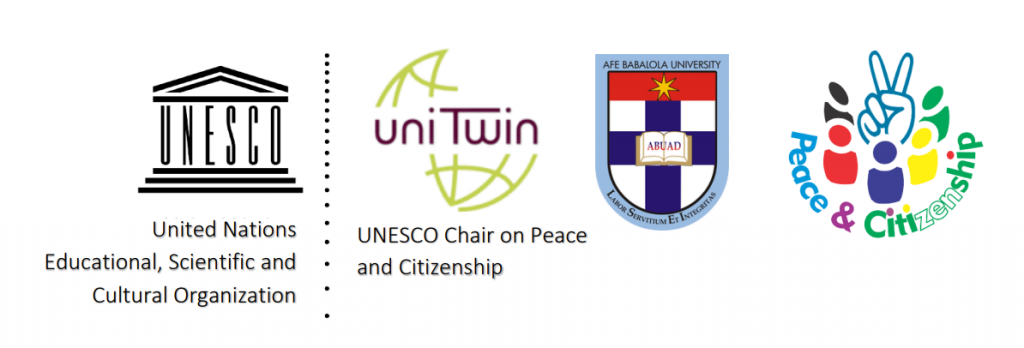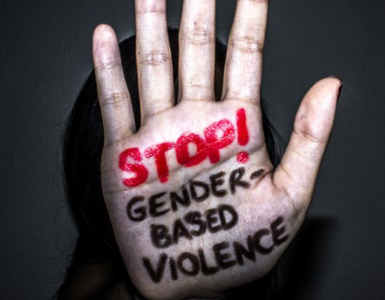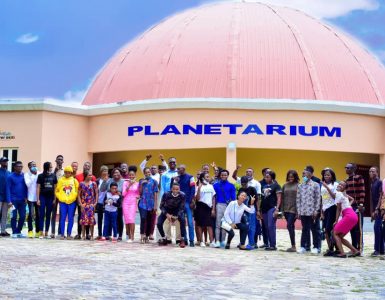SOURCE: ABUAD News 2022

ABUAD-UNESCO-Peace-and-Citizenship-in-2021
UNESCO-MONITORING-INSRUMENTS-for-ABUAD-UNESCO-CHAIR-FOR-ENTREPRENEURSHIP-EDUCATION-APRIL-2021-TO-MARCH-2022-1
About the Chair
The UNESCO Chair on Peace and Citizenship (2020), Afe Babalola University, Ado-Ekiti (ABUAD) (1392), UCPC ABUAD, for short was established in Afe Babalola University, Ado-Ekiti (ABUAD) in 19th February 2020 by the signing of the Agreement UNESCO, represented by its Director-General, Ms Audrey Azoulay and ABUAD, represented by its Acting Vice Chancellor, Professor Elisabeta Smaranda Olarinde. The is still fully operational in 2022 carrying out its activities. Click here to read the 2022 report of Activities.
As spelt out in the Agreement between UNESCO and ABUAD, the purpose of the Chair is to promote an integrated system of research, training, information, documentation and outreach activities on peace and citizenship. The Chair will facilitate collaboration between high-level, internationally-recognized researchers and teaching staff of the University and other institutions in Nigeria, as well as elsewhere in Africa, Asia and the Pacific regions, and in other regions of the world.
Consequently, the Chair will support UNESCO’s effort in the field of peace, active citizenship and human rights, while enhancing the ABUAD’s contribution to promoting global citizenship and culture of peace in Nigeria. The activities of the Chair will include developing more knowledge, technology and resources to face global challenges, human rights violations, inequality, exclusion, discrimination and violence, in line with UNESCO’s mission to build lasting peace, as embedded in the Strategic Objective 6 of the Medium-Term Strategy (37 C/4).
In promoting peace and active citizenship, as well as to provide knowledge base and access to information to resolve conflict, the Chair will further help about engaging young women and men as agents of change in their communities. In this regard, the multidisciplinary expertise of the Chair is leveraged upon to enable young women and men to engage as active citizens in their societies and realize their full potential as agents and subjects of social and economic transformations. This will particularly echo the objectives of the UNESCO Operational Strategy on Youth (2014-2022), and its three main axes: (a) policy formulation and review with the participation of youth; (b) capacity development for the transition to adulthood; and (c) civic engagement, democratic participation and social innovation.
Chair’s Objectives
The specific objectives of the Chair are to:
1. undertake empirical research on peace, conflict prevention and resolution with a view to better assess the challenges to promoting active citizenship and provide recommendations for improvement, in particular, in formal and non-formal settings;
2. help enhance the institutional capacity of relevant national and regional stakeholders involved in conflict prevention/resolution, and the development and promotion of active citizenship, notably among young women and men including, but not limited to, within education institutions:
3. promote effective and active citizenship for peaceful and inclusive societies, notably through the development of curriculum, education and awareness-raising tools as well as IT applications, to enhance access to information and citizenship education for women and vulnerable groups. Moreover, contribute to mainstreaming global citizenship in higher education;
4. contribute jointly with relevant community-based organizations, NGOs and higher education institutions on the formulation and implementation of effective policies for active citizenship;
5. promote networking, partnership and collaboration among national, regional and international stakeholders involved in peace-building and related fields, and facilitate the exchange of ideas on the teaching of econometrics, civics, participative democracy, and citizenship and peace. For this purpose, organize seminars, workshops and conferences, produce publications, and disseminate research results; and
6. cooperate closely with UNESCO and other UNESCO Chairs on relevant programmes and activities.
Composition
The Chair consists of the Chairholder, leading academics, policy-oriented researchers, professionals and students, within and outside ABUAD, required to carry out its specific objectives. It works with individuals with professional expertise and influence from all relevant disciplines and walks of life. The UCPC takes a multidisciplinary, interdisciplinary, and transdisciplinary approach to its activities and integrates theory and practice in the promotion of culture of peace and active citizenship. Professor Isiaka A. Badmus and Professor Demola Akinyoade are the Co-Chairholders.
Activities
The following are the Chair’s activity areas
- Research
- Training
- Information
- Documentation
- Outreach
The following people are involved in the daily activities of UCPC:
- The Co-Chairholders;
- Senior Programme Administrator
- Administrative Staff
- Volunteers
Contacts
GSM +234 806 264 6295, +234 805 770 2787
Email: unescochaironpeace@abuad.edu.ng
Webpage: https://www.abuad.edu.ng/abuad-unesco-chair-on-peace-and-citizenship/
College of Postgraduate Studies, Afe Babalola University, Ado-EKiti (ABUAD), Nigeria
















Add comment